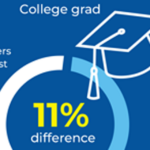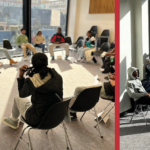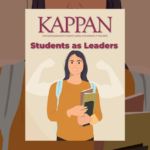In this week’s newsletter: Student and staff absences strain schools trying to stay open. National outlets struggle to report on school reopenings. Ed journalists give their predictions for 2022. And one reporter shares a telling image about the importance of local coverage.
STAFFING SHORTAGES & STUDENT ABSENCES
The big story of the week, according to us:
The big story of the week is schools struggling to stay open despite staffing shortages, missing kids, and political pressures to revert to remote. So far, most schools appear to have remained open, but school has only been back for two weeks:
🔊 The challenges of trying to keep schools open during the omicron surge (NPR)
🔊 Schools See Big Drop in Attendance as Students Stay Away (Wall Street Journal)
🔊 Extreme staffing shortages’ force CCSD to cancel classes, activities (Las Vegas Review Journal)
🔊 More than 62,000 LAUSD students, staff out as schools open (LA Times)
🔊 School districts ask parents to fill in as substitute teachers in Central Texas (KUT)
🔊 South Dakota schools ‘managing’ as COVID cases spike with omicron (Argus Leader)
🔊 Oregon schools struggle to stay open as omicron spreads (OPB)
🔊 Bay Area districts grapple with staffing, testing and masking challenges (SF Chronicle)
🔊 A record number of NYC kids have missed the last two weeks of school (New York Daily News)
🔊 Rural districts cancel classes due to staffing shortages (Dallas Morning News)
🔊 Metro schools battle to stay open (Atlanta Journal-Constitution)
In some districts — including Oakland, New York City, Chicago, and Boston — students or teachers held walkouts and sickouts.

PARENT FUNDING INEQUITY IN LAUSD
The best education journalism of the week, plus a runner-up and some bonus stories.
🏆 BEST: The best story of the week is Here’s How Much Money LA Parents Are Fundraising For Schools, And What It Buys by Kyle Stokes for KPCC and LAist. To explore how school donations widen the gap between LAUSD’s richest and poorest neighborhoods, Stokes identified nonprofit parent fundraising groups and mined tax records for two years. What he found was $30 million a year in private donations, distributed in a massively inequitable fashion. In LA’s most affluent neighborhoods, parent donations covered major costs — like new technology, music programs, and well-stocked libraries. In poorer neighborhoods, students often go without these things, even though they are all part of the same public education system. “This is a story about class, race, and gentrification,” tweeted KPCC education editor Ross Brenneman. “But also it’s about the inevitable endpoint of a funding system that many people have decried for decades.” The same story could be told in countless other big-city districts, but it often isn’t. Kudos to Stokes for doing this hard, but necessary, work.
🏆 RUNNER-UP: This week’s runner-up is National School Board Association unravels after calling out ‘domestic terrorism’ by Laura Meckler in the Washington Post. A national education reporter for the Post, Meckler describes how the National School Boards Association became mired in politics and has become a symbol of the division in education happening across the country. She details the process through which the organization sent a letter comparing parent protests to domestic terrorism, and the blowback that has resulted in 19 mostly GOP-led states withdrawing from the association. Thanks in part to email records uncovered through private efforts, Meckler’s story gets into the nitty-gritty of the so-called “school board wars” without amplifying conservative conspiracy theories about the Biden administration’s involvement.
BONUS STORIES:
🏆 COVID-19 surge exposes Mass. educational inequities in livestreaming classes (GBH)
🏆 A proposed Texas charter school promised to be antiracist. Then it got caught up in the critical race theory fight. (Chalkbeat)
🏆 San Francisco’s school board recalls are tearing Democrats apart (Washington Post)
🏆 More than 1 million fewer students are in college (NPR)
Did someone forward you this? You can sign up here. Or, you can view this newsletter in your browser.
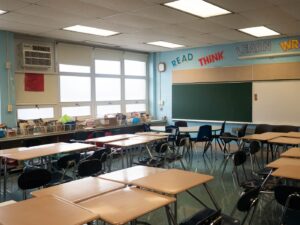
ROUGH START FOR NATIONAL NEWS
New from The Grade
In this week’s column, I describe how the Wall Street Journal, Washington Post, and New York Times have over-emphasized setbacks and failed to vet claims being made about school safety and/or risk in their 2022 coverage — and provide ideas about how to do things differently.
There are established ways for journalists to vet competing health claims in news stories. And journalists including US News’ Lauren Camera and The Atlantic contributor Amanda Ripley share some great ideas for how to cover the story in a more nuanced, contextualized, and compelling way.
ALSO: Take a look at the most-read commentary we published in 2021, featuring essays about controversial books, learning loss, rethinking the education beat, and more — most of them written by contributors.
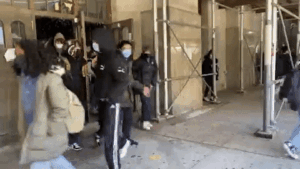
MEDIA TIDBITS
Thought-provoking commentary on the latest coverage.
Above: A student walkout in New York City has received a LOT of media attention, but parent Daniela Jampel wonders whether demographics and ideology play a part in the coverage. (Video courtesy of NY1 education reporter Jillian Jorgensen.)
📰 SCHOOL CLOSING MISMATCH: While media coverage has focused on school/childcare shutdowns that are taking place, five out of six parents in the new Ipsos poll say that they have not personally experienced an interruption like the ones being highlighted in the news. Meanwhile, three out of four parents say that they don’t feel that school represents a serious safety risk, much higher than last summer. That’s the story, in my opinion, though national outlets seem determined to tell it the other way around. I’m concerned that media outlets are over-focused on stories about shutdowns, staffing shortages, and student absences, downplaying the preponderance of open schools serving vulnerable kids who may have no place else to go. For more on that, read Slate’s new interview with a NYC high school principal whose school is making it work.
📰 PUTTING PARENTS, STUDENTS, AND TEACHERS FRONT AND CENTER: Kudos to Chalkbeat Chicago and other outlets for finding ways to focus on kids and parents rather than district officials and interest group representatives. “We work hard in all of our coverage to include parent and student voice,” Chalkbeat Chicago editor Cassie Walker Burke told us when asked about a recent parent-focused story. Looking for more parent-focused coverage? Check out Thursday’s episode from The Daily podcast, which features lots of interviews with parents and teachers by Rob Szypko and Clare Toeniskoetter. And Sahan Journal’s Becky Dernbach interviewed teachers of color about reopening during Omicron. Keep it up, everyone!
📰 PREDICTIONS FOR 2022: A reporter at a national outlet predicts that “education is in the middle of a partisan firestorm that will grow through governor’s races in 2022. And so we’ll have to develop the skills of political reporters and work alongside them.” The reporter, who wanted to remain anonymous, also predicts that education journalists will have to “contend with their beat slipping back down the list of priorities after several seasons of heightened interest.” Looking for more predictions? Check out Yasmine Askari’s Five 2021 education stories that will continue to matter in 2022 for MinnPost. Or, share your own predictions and tag @thegrade_.
📰 CASE COUNTS ARE SO 2021: Speaking of the future: “The Associated Press has recently told its editors and reporters to avoid emphasizing case counts in stories about the disease,” according to a recent AP story. Stateline also has a story about the shift towards other measures. With Omicron and the rise of home testing, case count numbers have become meaningless. It’s a new year. Time to update your coverage strategies?
Looking for media commentary and analysis all day, every day? Follow me at @alexanderrusso.
PEOPLE, JOBS
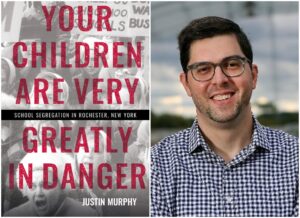
Above: Big congrats to Democrat and Chronicle education reporter Justin Murphy for his forthcoming book, Your Children Are Very Greatly in Danger: School Segregation in Rochester, New York, which explores the roots of present-day segregation in the Rochester area. It will be released on March 15.
🔥 Impact: Kudos to the Richmond Times-Dispatch’s Kenya Hunter, whose six-month investigation on diversity efforts at the Maggie L. Walker Governor’s School inspired journalism students there to do some digging of their own. It turned into a neat project in their student newspaper The Jabberwock called “Project 1937: Buried History, New Promises.”
🔥 Job moves: Eder Campuzano has left The Oregonian to cover education statewide for the Minneapolis Star-Tribune. Chronicle of Higher Education reporter Lindsay Ellis is moving onto the Wall Street Journal, where she’ll cover “business schools, the college-to-career transition, and young professionals at work.” And the Salt Lake Tribune has a new K-12 education reporter: Connor Sanders.
🔥 Huzzah! Congrats to Wall Street Journal higher ed reporter Melissa Korn and reporter Andrea Fuller for winning the Best Newspaper Investigative Reporting award from the Newswomen’s Club of New York for their story ‘Financially Hobbled for Life’ The Elite Master’s Degrees that Don’t Pay Off. And Korn had another huge story this week that you shouldn’t miss: Yale, Georgetown, Other Top Schools Illegally Collude to Limit Student Financial Aid, Lawsuit Alleges.
🔥 More job openings: The Seattle Times is still looking for an Ed Lab reporter. Could that be you? The Boston Globe is hiring a data journalist and a digital producer for their Great Divide team. Politico California is hiring an education reporter. EdWeek Market Brief is looking for a senior digital analyst and an assistant managing editor. (See both jobs ads here.) WBEZ Chicago is hiring an education reporter. WBUR Boston public radio is still looking for a new education editor.
EVENTS, MEDIA APPEARANCES

Above: You should probably be watching “Abbott Elementary” on Hulu. “Seriously. It’s the best,” says New York Times ed reporter Erica Green.
⏰ New endeavors: The AP is starting a new education initiative, and so far there are job openings for a reporter, a data journalist, and a news director. We’re told they’ll have a formal announcement on this next week. WBEZ Chicago and the Sun-Times — both with strong education reporters — are said to be merging. Inside Higher Ed has joined forces with Times Higher Education “to create a global powerhouse covering postsecondary education,” according to Inside Higher Ed co-founder Doug Lederman. L.A. Taco is coming out with a new monthly education column by staff writer Janette Villafana, which will feature the outlets’s “tried-and-true intersectional reported features.”
⏰ Media appearances: WBEZ’s Sarah Karp was on MSNBC Reports: Weekends to talk about the teachers union’s conflict with the mayor over reopening schools. The New York Times’ Giulia Heyward joined WNYC’s The Takeaway to discuss substitute teacher shortages across the country. KQED’s Vanessa Rancaño was on the station’s podcast The Bay to talk about Bay Area students going back to school amid a surge in COVID cases. San Francisco Chronicle education reporter Jill Tucker was on the paper’s Fifth & Mission podcast to talk about teacher and staff shortages. And The 74’s Mark Keierleber was on WAMU’s 1A to talk about student surveillance.
⏰ Upcoming: KPCC/LAist K-12 reporter Kyle Stokes will speak with experts on school funding about his story on parent donations on Jan. 26, and attendees will also have a chance to ask questions.
THE KICKER
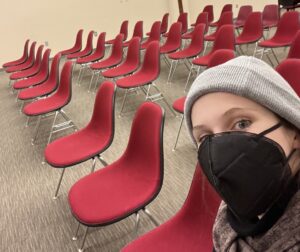
“I’m the only person left at the school board meeting tonight,” tweeted Des Moines Register and Iowa City Press-Citizen education reporter Cleo Krejci. “This is why we need local reporters!”
That’s all, folks. Thanks for reading!
Reply to this email to send us questions, comments or tips. Know someone else who should be reading Best of the Week? Send them this link to sign up.
Using Feedly or FlipBoard or any other kind of news reader? You can subscribe to The Grade’s “feed” by plugging in this web address: http://www.kappanonline.org/category/the-grade/feed/.
Read more about The Grade here. You can read all the back issues of The Grade’s newsletter, Best of the Week, here.
By Alexander Russo with additional writing from Colleen Connolly.
ABOUT THE AUTHOR

Alexander Russo
Alexander Russo is founder and editor of The Grade, an award-winning effort to help improve media coverage of education issues. He’s also a Spencer Education Journalism Fellowship winner and a book author. You can reach him at @alexanderrusso.
Visit their website at: https://the-grade.org/








